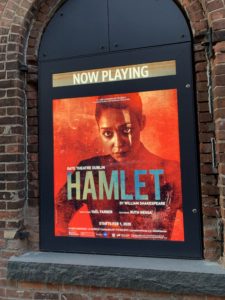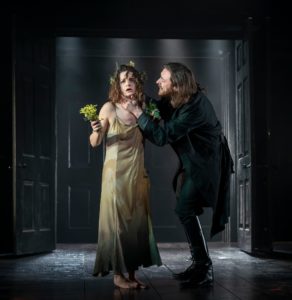Watching an oft-staged play like Hamlet for the nth time often carries a sense of being, as the not-penitent King says, “to double business bound,” since I’m often half a line ahead in my imagination. Sometimes a familiar line breaks through, as when Ruth Negga’s electric, energized, antic Hamlet sang out above a newly-dug grave,

I loved Ophelia!
Her cry started me counting under my mind’s breath, how many brothers was it that Hamlet exceeds with his love? Five hundred? Ten thousand? Or was it —
Forty thousand brothers / Could not with all their quantity of love / Make up my sum!
That seemed about right. Hamlet beats Laertes, played by Gavin Drea in an Irish production that arrived in Brooklyn from the Gate Theater of Dublin, by about 40,000. That’s pretty much how I felt about Ruth Negga’s coiled-spring performance. Diminutive and mobile, one of two dark-skinned actors (along with Steve Hartland as the Ghost) amid a pale Hibernian cast, Negga was at her best when she was antic and overflowing, dancing around her shocked mother in the closet scene, extending a kiss with an embarrassed Ophelia when almost sitting on her lap right behind me in the audience before they watched the Mousetrap, nimbly fencing in one of least exhausted stagings I’ve seen of the closing bloodbath. I gobbled up her performance of the soliloquies a bit less eagerly, because her Hamlet seemed uncharacteristically social and eager to reach others, from the Ghost he followed in act 1 to the false friends Rosencrantz and Guildenstern. Director Yael Farber’s decision to stage the first soliloquy — “O that this too-too solid flesh…” — to Ophelia rather than alone on stage was odd, and it made Hamlet’s self-revulsion feel performative more than sincere. But in thinking about it now, I wonder if this Hamlet might just be less solitary than most versions of the role. Plus I’m not sure this play believes in sincerity very much.
In addition to Negga’s stage charisma, another reason this Hamlet might feel more connected may have been the range and power of Aoife Duffin’s Ophelia. I’m not sure I’ve ever seen this role played with more force, from the lingering kiss she planted on Hamlet before his first soliloquy, to her heart-wrenching songs, the lines of which she mostly spoke after a musical rendition from an off-stage performer, to the knowing smirks with which she managed her brother and father in the opening act. Ophelia’s tragedy seldom finds as much room for itself as Duffin claimed for her in this production. Even though she ends up drowned and buried, this performance made me wonder about an Elsinore initially disrupted as much by the counselor’s powerful daughter who isn’t willing to accept her place as servant, as by the better-known melancholic prince.

It doubtless shows my age that I continue to appreciate a straight-backed Polonius, played by Nick Dunning as more master of courtly intrigue than foppish father — though his children do roll their eyes as they repeat along with him, “to thine own self be true” in act 1.
The royal couple itself felt a bit weaker to me, or at least less dramatically interesting than they can be. Owen Roe’s stout Claudius wore a faux-Fascist military uniform, which seemed off since I think of Old Hamlet as the warrior among the brothers. Fiona Bell’s Gertrude held her cards close with her brother-husband, then turned toward Hamlet’s side in the second half of the play, but mostly without claiming much emotional investment, from me at least.
But that’s probably because in this Hamlet I was as engaged as I’ve ever been by the young lovers, and the brutality of their separation by politics, revenge, and the prince’s choice to heed dead voices rather than living ones. I’ll remember Negga’s Hamlet for a series of brilliant exchanges, hamming it up with the Players, teasing Rosencrantz and Guildenstern with the recorder, holding Horatio to his “heart’s core.” But when Ophelia first kissed him and he responded with the extended poetry that includes “Frailty, thy name is woman” it seemed clear that the prince who can reach everyone has lost track, at least until he out-faced Laertes at her grave, of the one figure who might have matched him.

I think all the rest of the performances through March 8 are sold out — but if you’re near the Brooklyn waterfront, it might be worth checking for cancellations!